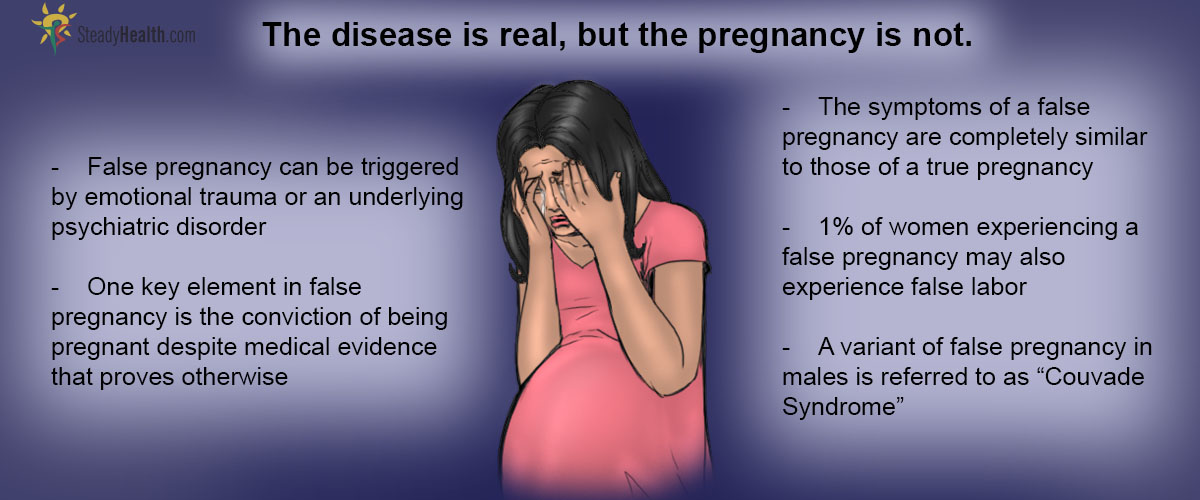The power of the human mind and body goes beyond our mere human control and sometimes, because of that, we are faced with physical and mental situations that we can barely start to understand. The condition called “Pseudocyesis”, medical term for a so-called “psychological pregnancy”, “false pregnancy” or “phantom pregnancy” is certainly one of those conditions where our body and mind seem to be playing tricks on us.
What is a Psychological pregnancy?
A psychological pregnancy refers to a state in which a woman experiences all the symptoms of pregnancy without actually being pregnant. For years, psychological pregnancies have remained a medical mystery, with doctors being unable to explain this rather rare occurrence in the absence of an actual pregnancy. But today, even though all causes of psychological pregnancies are not fully elucidated, the most common have been identified as possible triggers for this disturbance.
Most common causes of pseudocyesis
It’s Mostly a Mind Thing…
When a woman is having an intense desire to get pregnant, her body might actually trick her into believing that she is indeed pregnant. Researchers have demonstrated that the most common causes of psychogenic pregnancies are unconscious psychological factors. This occurrence can be triggered by emotional trauma such as repeated miscarriages, a recent diagnosis of infertility, a desire to get married, or even an impending menopause, which marks the end of a woman’s reproductive years. As a result of that, because the thought of being pregnant is extremely strong, the mind influences the body into releasing pregnancy hormones that account for the experienced symptoms.
A rather uncommon psychiatric disorder, multiple personality disorder could also be identified as a cause of pseudocyesis. For instance, in one of her dysfunctional personalities, a woman might believe that she is pregnant (and actually experience the symptoms of pregnancy). This could also be possible in women suffering from schizophrenia and who experience delusions of being pregnant.
See Also: Early Pregnancy Symptoms and Signs
Hormonal dysfunction
Imbalance of hormone levels can also be a valid explanation to justify why a woman can be considered as pregnant even if she is not. Pregnancy is strongly dependent on the main female hormones which are estrogen and progesterone. Progesterone plays a major role in facilitating the fetus implantation in the uterus in the first few weeks and the first trimester, until the placenta can start functioning on its own. Once the fetus is correctly implanted, it starts secreting a hormone called Beta Human Chorionic Gonadotropin (bHCG, the beta chain is specific for the placenta). That is the hormone that would be detected on a urine pregnancy test, as it starts being excreted in the mother’s urine between 10 t0 14 days. Sometimes, pregnancies that are not viable or cancers of the germ cells that develop during pregnancy (choriocarcinoma, moles, etc.) can lead to a persistently elevated level of bCHG hormone in the blood, long after the pregnancy has been physiologically terminated. Other types of hormonal dysfunction could be ovarian tumors producing high levels of female hormones, henceforth mimicking the symptoms of pregnancy: missed periods, morning sickness, weight gain, breast tenderness.
Symptoms Of Psychological Pregnancy
Because the symptoms of false pregnancy are exactly identical to those of a true pregnancy, it is extremely difficult to dissociate both physiological states. In 18% of cases, doctors actually misdiagnose women suffering from false pregnancy as being pregnant. However, as mentioned earlier, a woman with a false pregnancy would experience all the symptoms of a normal pregnancy, but a pelvic ultrasound would reveal no fetus in the uterine cavity. Another key symptom of pseudocyesis is the fact that the woman is convinced that she is pregnant.

Symptoms common to true and false pregnancy include: missed periods, breasts tenderness, morning sickness, pregnancy glow and weight gain. Abdominal distension occurs in 60-90% of cases, as the uterus expands in the same manner as it does in a normal pregnancy. In some cases, 50-75% of women can report fetal quickening (fetal movements in utero), even though there is no fetus in the uterine cavity. 1% of women could experience false labor.
Could this happen to men too?
A variant of psychogenic pregnancy has also been identified in men, and is called Couvade Syndrome. This is a state in which a male partner experiences the same symptoms of his expectant female partner, possibly as a result of the anxiety of expecting a child and impending fatherhood. Research done by Osvlosky and Culp (1989) also revealed that the experience of pregnancy could also trigger the re-emergence of the Oedipal Conflict in the male partner, thus triggering pregnancy symptoms in the male. And in addition to this, some studies have shown that if a male partner cohabitates with a pregnant female, there is a possibility that he might experience hormonal shifts in his levels of estradiol, testosterone, prolactin and cortisol, thus yielding the typical symptoms of pregnancy (morning sickness, weight gain, breast engorgement, etc.). However, this is extremely rare.
Although Couvade Syndrome has not been classified as a medical condition, several researches have been performed on this.
How can Psychological pregnancy be treated?
The approach in managing pseudocyesis is multifactorial. Because the key element in this disorder is the fact that the female patient believes that she is pregnant, care should be applied when breaking the news to the patient that she isn’t. The act of anticipating and expecting the upcoming of a new child is a life changing event for almost all mothers. Thus, the transition into accepting that this is not truly happening should be done with as much as tact as possible. Remember, pseudocyesis can be triggered by repeated miscarriages, and many of the women who are experiencing this disorder have had a sort of pregnancy experience before.
Read More: 14 Tips to Prepare Your Body and Mind for Pregnancy
In the event that a medical condition (such as an ovarian tumor) is identified as the cause of the false pregnancy, the problem should be treated medically. Also, medications can be given to cancel the symptoms. If a patient is identified as having an underlying psychological problem, she should be referred to a psychiatrist for evaluation and curative psychotherapy.
- Mindmap by steadyhealth.com
- Photo courtesy of Morgan by Flickr : www.flickr.com/photos/meddygarnet/4163753718
- en.wikipedia.org/wiki/False_pregnancy#Signs_and_symptoms
- www.webmd.com/baby/guide/false-pregnancy-pseudocyesis
- http://www.babycenter.com/0_strange-but-true-false-pregnancy_10364942.bc http://en.wikipedia.org/wiki/Couvade_syndrome


